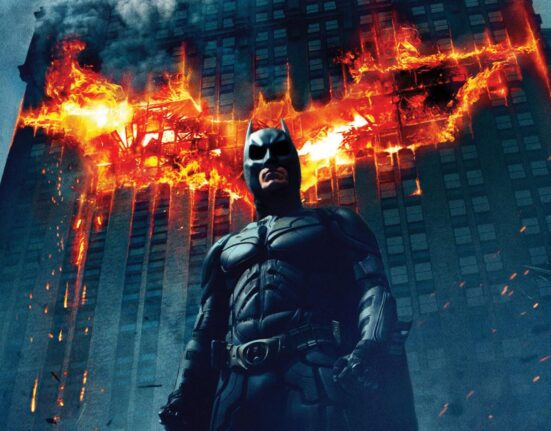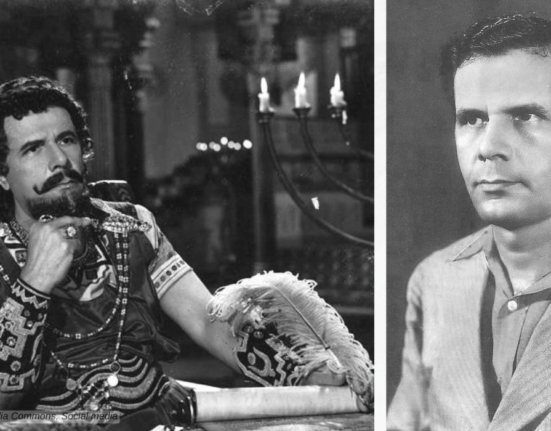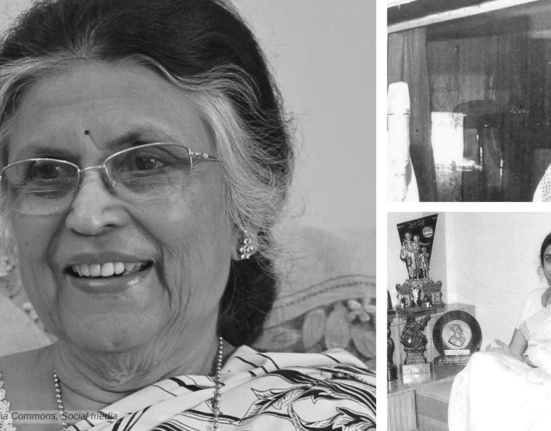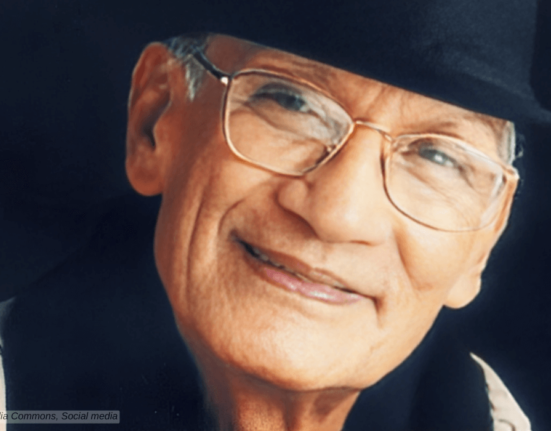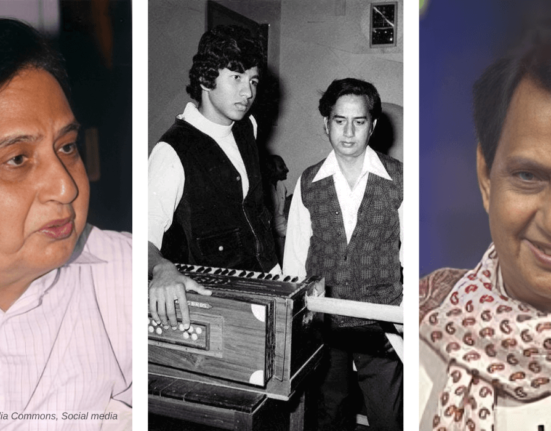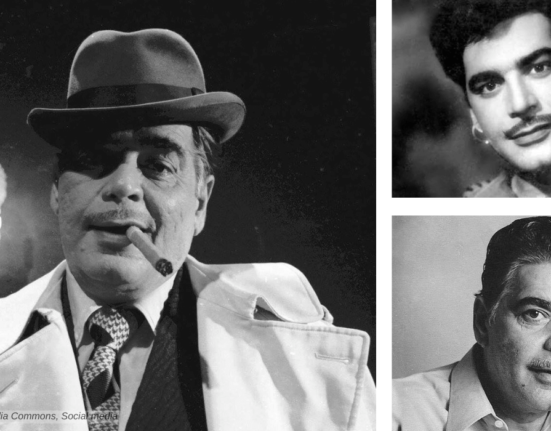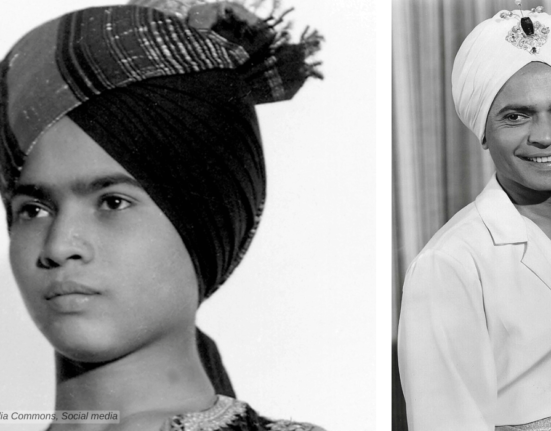One of the pillars of Hindi film playback singing, Mukesh will always be remembered for his beautiful, soft voice, which had a unique emotive quality and unparalleled honesty.
Mukesh Chand Mathur, known simply as Mukesh, Born on July 22, 1923, in Delhi, Mukesh’s journey into the world of music was one of passion and perseverance. After passing his 10th standard, he had a brief stint working for the Department of Public Works. Mukesh was a die-hard fan of legendary singer-actor K.L. Saigal. Mukesh was known for singing Saigal’s songs from a young age, when famous actor Motilal heard him singing at a wedding. Impressed by his voice, Motilal brought him to Bomaby and even arranged his formal music training. Mukesh received formal training under Pandit Jagannath Prasad for a few years.
when an unknown printer took a galley of type and scrambled it to make a type area specimen book It has survived not only five centuries.but also the leap introduce electronic typesetting, remaining essentially unchanged.
Willum Skeener
Mukesh made his debut as a playback singer and actor in the 1941 film “Nirdosh,” opposite Nalini Jaywant. In the film, he sang the solo ghazal “Dil Hi Bujha Hua Ho To,” as well as two duets with Nalini Jaywant: “Tumhi Ne Mujhko Prem Sikhaya” and “Main Hoon Pari.” As an actor-singer, Mukesh also appeared in films like Dukh Sukh (1942), Adab Arz (1943), Noor-E-Arab (1946), Jhalak (1947), and Roomal (1949).
In this early period, some of his notable songs include “Ab Der Na Kar Saajan” in Dukh Sukh (1942), “Kya Logi Is Dil Ka Kiraya” in Us Paar (1944), “Gokul Ki Ek Naar Chhabili” in Bachpan (1945), “Badariya Baras Gayi Us Paar,” and “Maana Ke Tum Haseen Ho” in Moorti (1945), among others.
His breakthrough came with the song “Dil Jalta Hai To Jalne De (Pahli Nazar),” which got him noticed as a new voice to look for. Mukesh followed it with songs like “Tay Karke Badi Door Ki Purpech Dagariya (Pahli Nazar, 1945),” “Pathhar Se Tum Doodh Bahao Aag Se Phool Khilao (Neel Kamal, 1947),” “Kisne Chheda Man Ka Taar (Tohfa, 1947), etc.

In 1948, Mukesh sang for Raj Kapoor’s “Aag,” which started a long working relationship and gave birth to one of the most iconic singer-actor pairs in the Hindi film industry. “Zinda Hoon Is Tarah,” from “Aag,” which became an instant hit on its release, continues to enchant music lovers, even after so many decades. In his next film with Raj Kapoor, “Barsaat (1949),” he sang two songs, “Chhod Gaye Baalam Mujhe” and “Patli Kamar Hai Tirchi Nazar Ha.”
He sang for Raj Kapoor. In films like Sunehre Din (1949), Bawre Nain (1950), Awara (1951), Aah (1953), Shree 420 (1955), Chori Chori (1956), Phir Subha Hogi (1958), Parvarish (1958), Anari (1959), Char Dil Char Rahen (1959), Main Nashe Men Hoon (1959), Jis Desh Men Ganga Behti Hai (1960), Chhalia (1960), Dil Hi To Hai (1963), Ek Dil Sau Afsane (1963), Sangam (1964), Teesri Kasam (1966), Around the World (1967), Sapno Ka Saudagar (1968), Mera Naam Joker (1970), Kal Aaj Aur Kal (1971), Dharam Karam (1975), and many more.
Some of his famous songs for Raj Kapoor include “Khayalon Mein Kisi Ke Is Tarah Aaya Nahin Karte,” “Raat Andheri Door Savera,” “Awaara Hoon,” “Dam Bhar Jo Udhar Munh Phere,” “Ichak Dana Beechak Dana,” “Mera Joota Hai Japani,” “Ramaiya Vastavaiya,” “Zindagi Khwab Hai,” “Aansoo Bhari Hai Yeh Jeevan Ki Raahen,” “Woh Subah Kabhi Toh Aayegi,” “Kisi Ki Muskurahaton Pe Ho Nisar,” “Sab Kuchh Seekha Humne,” “Mujhko Yaaron Maaf Karna Main,” “Mere Toote Hue Dil Se,” “Dum Dum Diga Diga,” “Chhalia Mera Naam,” “Aa Ab Laut Chalen,” “Jis Desh Mein Ganga Behti Hai,” “Tum Agar Mujhko Na Chaho To,” “Bol Radha Bol Sangam Hoga Ke Nahin,” “Har Dil Jo Pyar Karega,” “O Mehbooba,” “Duniya Banane Wale Kya Tere Man Mein Samaai,” “Sajan Re Jhooth Mat Bolo,” “Sajanwa Bairi Ho Gayi Hamaar,” “Jaane Kahan Gaye Woh Din,” “Jeena Yahan Marna Yahan,” “Kehta Hai Joker Saara Zamana,” “Ek Din Bik Jayega Maati Ke Mol,” and many more.
In 1948, Mukesh sang for another superstar, “Dilip Kumar,” in “Mela,” under the music direction of Naushad. The film’s songs, like “Gaaye Ja Geet Milan Ke,” “Mera Dil Todne Wale,” and “Dharti Ko Aakash Pukare,” were considered classics. His next significant film was Mehboob Khan’s “Andaz,” where he sang “Hum Aaj Kahin Dil Kho Baithe,” “Jhoom Jhoom Ke Naacho Aaj,” “Toote Naa Dil Toote Naa,” and “Tu Kahe Agar Jeevan Bhar” for Dilip Kumar.
Mukesh sang for Dilip Kumar in a few more films, like Anokha Pyar (1948), Shabnam (1949), Madhumati (1958), and Yahudi (1958). Some of the famous songs that he sang for Dilip Kumar include “Jeevan Sapna Toot Gaya,” “Dil Tadap Tadap Ke Kah Raha,” “Suhana Safar Aur Yeh Mausam,” and “Yeh Mera Deewanapan Hai.”
He also sang for Dev Anand in many films. Some of his notable songs for Dev Anand include “Bahe naa kabhi nain se neer” and “Laayi khushi ki duniyaa hansti huyi jawaani,” in Vidya (1948), “Ye duniya hai yahaan dil ka lagaana kisko aata hai,” in Shair (1949), “Ai Jane Jigar Dil Me Samane Aaja,” in Aaram (1951), “Chal Ri Sajni Ab Kya Soche,” in Bombai Ka Babu (1960), “Jab Gham E Ishq Sataata Hai,” in Kinare Kinare (1963), among others.
Some of the famous films he sang for in the 1950s include Anokhi Ada (1948), Sohag Raat (1948), Lekh (1949), Thes (1949), Aankhen (1950), Hamari Beti (1950), Sartaj (1950), Bari Bahoo (1951), Malhar (1951), Shisham (1952), Mashuqa (1952), Chandni Chowk (1954), Anuraag (1956), Jagte Raho (1956), Kathputli (1957), Barkha (1959), Chhoti Bahen (1959), Didi (1959), Kanhaiya (1959), Rani Rupmati (1959), Ujala (1959), Dil Bhi Tera Hum Bhi Tere (1960), Ek Phool Char Kante (1960), Hum Hindustani (1960), Love In Simla (1960), Saranga (1960), Shriman Satyawadi (1960), and many more.
Some of his notable songs in this period include Bade Aarmanon Se Rakha Hai Balam Teri Kasam (Malhar), Hamen Ae Dil Kahin Le Chal (Chandni Chowk), Sab Shikhwe Mite Dil Ke (Khaiber), Jaoon Kahan Bataa Ae Dil (Chhotio Bahan), Tum Mujhe Bhool Bhi Jao To (Didi), Ruk Ja O Janewali Ruk Ja (kanhaiya), Do Roz Mein Woh Pyar Ka Aalam (Pyar Ki Rahen), Aa Laut Ke Aaja Mere Meet (Rani Rupmati), Duniyawalon Se Door (Ujala), Mujhko Is Raat Ki Tanhai Mein (Dil Bhi Tera Hum Bhi Tere), Matwaali Naar Thumak Thumak Chali (Ek Phool Char Kante), Teri Shokh Nazar Ka Ishara (patang), Saaranga Teri Yaad Mein (Saranga), and many more.
Over the years, Mukesh’s voice became synonymous with the portrayal of pathos in Hindi film music. His ability to convey deep emotions through his singing made him the preferred voice for leading actors of his time, including Manoj Kumar, Feroz Khan, Sunil Dutt, Jeetendra, Sanjeev Kumar, Rajesh Khanna, and Amitabh Bachchan. Mukesh has the curious record of singing one of the most famous songs of almost every big actor.
Some of his notable songs in the 1960s include “Tum Roothi Raho Main Manata Rahoon (Aas ka Panchi),” “Gardish Mein Hon Taare (Reshmi Roomal),” “Bhooli Hui Yaadon Mujhe Itna Na Sataao (Sanjog),” “Mujhe Raat Din Yeh Khayal Hai (Oomar Qaid),” “Teri Yaad Dil Se Bhulane Chala Hoon,” “Ibteda-E-Ishq Mein Hum Saari Raat Jaage” (Hariyali Aur Rasta), “Jhoomti Chali Hawa (Sangeet Samrat Tansen),” “O Janewale Ho Sake To Laut Ke Aana (Bandini),” “Chand Aahen Bharega (Phool Bane Angaare),” “Hum Chhod Chale Hain Mehfil Ko (Ji Chahta Hai), “Jyot Se Jyot Jagaate Chalo Prem Ki Ganga Bahaate Chalo (Sant Gyaneshwar),” “Chand Si Mehbooba Ho Meri” “Main To Ek Khwab Hoon” (Himalay Ki God Mein), “Humsafar Mere Humsafar,” “Tumhen Zindagi Ke Ujale Mubarak” (Purnima), “Jis Dil Mein Basa Tha Pyar Tera (Saheli),” “Mera Rang De Basanti Chola (Shaheed),” “Aaya Hai Mujhe Phir Yaad,” “Baharon Ne Mera Chaman Loot Kar,” (Devar), “Dil Ne Phir Yaad Kiya (Dil Ne Phir Yaad Kiya),” “Chand Ko Kya Maloom (Mere Lal),” Tum Bin Jeevan Kaise Beeta (Anita),” “Yeh Kaun Chitrakaar Hai (Boond Jo Ban Gayee Moti),” “Waqt Karta Jo Wafa Aap Hamare Hote (Dil Ne Pukara),” “Hum To Tere Aashiq Hain Sadiyon Purane (Farz),” “Main Toh Deewana,” “Sawan Ka Mahina Pawan Kare Sor,” (Milan),” Tauba Yeh Matwali Chaal (Patthar Ke Sanam),” “Deewanon Se Yeh Mat Poochho (Upkar),” “Jinhen Hum Bhoolna Chahen (Aabroo),” “Oh Re Taal Mile Nadi Ke Jal Mein (Anokhi Raat),” ” Mera Pyar Bhi Tu Hai (Saathi),” “Chandan Sa Badan Chanchal Chitwan,” “Phool Tumhein Bheja Hai Khat Mein,” (Saraswatichandra), “Je Hum Tum Chori Se (Dharti Kahe Pukar Ke),” “Chal Akela Chal Akela Chal Akela,” “Chaandi Ki Deewar Na Todi (Viswas),” and many more.
In the 1970s, Mukesh continued to sing selected songs like “Kahin Door Jab Din Dhal Jaye,” “Maine Tere Liye Hi Saat Rang” (Anand), “Main To Har Mod Par Tujhko Doonga Sadaa (Chetna),” “Meri Tamannaon Ki Taqdeer Tum (Holi Aaee Re),” “Jis Gali Mein Tera Ghar Na Ho Baalma (Kati patang),” “Kisi Raah Mein Kisi Mod Par (Mere Humsafar),” “Woh Tere Pyar Ka Gham,” “Zikr Hota Hai Jab Qayamat Ka” (My love), “Bas Yehi Apradh Main Har Baar,” “Woh Pari Kahan Se Laaoon” (Pehchan), “Koi Jab Tumhara Hriday Tod De (Purab Aur Pachhim),” “Jo Tumko Ho Pasand Wohi Baat Kahenge (safar),” “Taaron Mein Saj Ke Apne Sooraj Se ( Jal Bin Machhli Nritya Bin Bijli),” “Zuban Pe Dard Bhari Daastan (Maryada),” “Darpan Ko Dekha Tune Jab Jab Kiya Singar (Upaasna),” “Ye Dil Le Kar Nazraana (Ek Bar Mooskura Do),” “Dheere Dheere Bol Koi Sun Naa Le (Gora aur Kala),” “Ek Pyaar Ka Nagma Hai,” “Paani Re Paani Tera Rang Kaisa,” (Shor), “Kahin Karti Hogi Woh Mera Intezaar( Phir Kab Milogi ),” “Main Naa Bhoolunga (Roti Kapada Aur Makaan),” “Main Dhoondhta Hoon Jinko Raaton Ko (Thokar),” “Kya Khoob Lagti Ho Badi Sundar Dikhti Ho (Dharmatma),” “Ek Hasrat Thi Ke Aanchal Ka Mujhe Pyar Mile (Zindgi Aur Toofan),” “Humka Aisa Waisa Naa Samjho,” “Behna O Behna (Adalat), “Kabhi Kabhi Mere Dil Mein Khayal Aata Hai,” “Main Har Ek Pal Ka Shayar Hoon,” (Kabhi Kabhie), “Humko Tumse Ho Gaya Hai Pyar (Amar Akbar Anthony),” “Lalla Lalla Lori Doodh Ki Katori,” “Suhani Chandni Raaten Hamen Sone Nahin Detin,” (Mukti) and many more.


His contributions to the industry were recognised with numerous awards, including the National Film Award for Best Male Playback Singer for the song “Kai Baar Yuhi Dekha Hai” from the film Rajnigandha (1973). He also won four Filmfare Awards for Best Singer and was nominated for 12 more.
Mukesh Ji passed away after a massive heart attack on August 27, 1976, in Detroit, Michigan, USA, where he was scheduled to perform on the same night.
Mukesh’s legacy continues to resonate with music enthusiasts around the world. Nearly five decades after his death, his songs are still celebrated and performed, reflecting the timeless quality of his work. His son, Nitin Mukesh, along with other family members, have been instrumental in keeping his memory alive through concerts and tributes.
In 2023, the centenary of Mukesh’s birth was marked by a series of global concerts, showcasing his extensive repertoire of over 1500–2000 songs in Hindi and other regional languages. His voice, which captured the essence of human emotion, continues to inspire and move people across generations.




